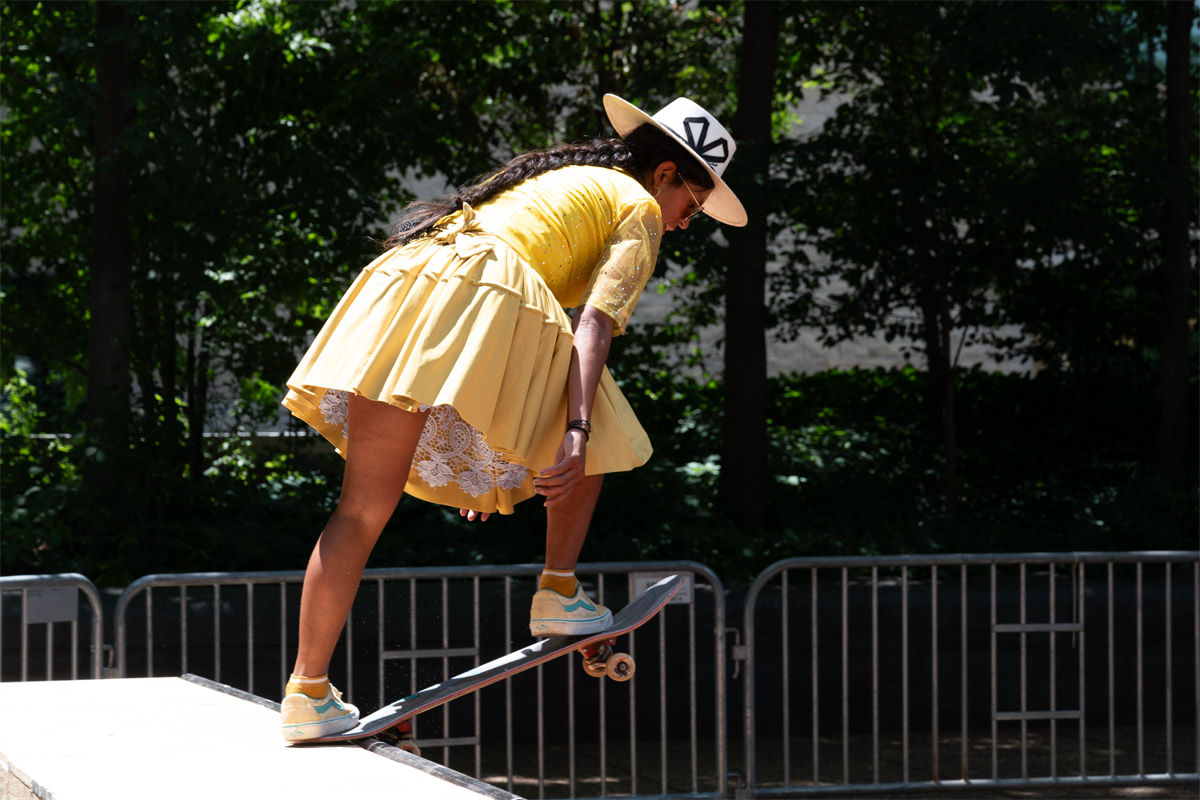How Imilla Skate Celebrates Skateboarding’s Indigenous Past and Present

Deysi Tacuri skates on the half-pipe outside the National Museum of the American Indian. She is a member of Imilla Skate, an organization of Indigenous women skaters.
Photo by Sonya Pencheva, Ralph Rinzler Folklife Archives
This week, a group of Smithsonian Folklife Festival participants from across the Americas will ride together on the National Mall in celebration of a shared message: skateboarding is an Indigenous sport.
As part of the Indigenous Voices of the Americas program (June 26 to July 1), these athletes present a series of collaborative “skate jam” sessions outside the National Museum of the American Indian on Jefferson Drive. Visitors will be welcomed by an international team of skateboarders, artists, and activists expressing Indigenous resilience through skate culture.
Among them are Deysi Tacuri Lopez and María Belén Fajardo Fernández, two members of Imilla Skate, an all-women skateboarding collective from Cochabamba, Bolivia. The crew has attracted an international following by skateboarding in their grandmothers’ traditional polleras—colorful, layered skirts worn by Indigenous Aymara and Quechua women of the Bolivian highlands.
The garments are associated with both ancestral pride and stigma among Bolivians. Until recently, Indigenous women—known colloquially as cholitas—were scorned for their traditional dress and even denied entry from public spaces. The skirts endured as an aesthetic of defiance, however, and are now a widely recognized symbol of national identity.
Today, the women of Imilla Skate are recontextualising this image. Invoking the strength of generations before them, they embrace their Andean heritage while pushing out into the future.
“It’s beautiful to get to be a part of something like this,” Lopez told me over the phone from Cochabamba a week prior to the Festival. “We’re looking forward to interacting with the public and getting to share our message.”

At the Skating and Skate Art demonstration area, Imilla Skate is joined by Di’orr Greenwood (Diné/Navajo), Keith Secola, Jr. (Northern Ute/Anishinaabe), and Manny Santiago (Taíno). Each has a unique personal and cultural relationship to the sport, whose roots trace back to the papa he’e nalu (surfboards) and papahōlua (land sleds) of Native Hawaiians.
Greenwood is a competitive skateboarder, designer, and flute maker who is deeply informed by her Navajo heritage. Secola is an interdisciplinary visual artist and skater whose work traces the historical and contemporary threads of Native American identity. Santiago represents Puerto Rico as an Olympic skateboarder and works extensively to support the island’s growing skate community.
“We all have our own style and perspective,” Lopez reflected. For her, skateboarding has become a way of life—an extended family that uplifts and supports each other. And while this community has certainly become a creative space for the exploration and expression of cultural identity in many circles—as with Imilla Skate and the Indigenous Bolivian heritage they honor—its ability to transcend cultural differences is equally as inspiring.
“La cultura de skate no tiene fronteras,” Lopez explained—skating culture has no borders. “Each community has its own essence, but there is a point at which they merge into one. We’re all human.”
Whether inside the concrete bounds of local skateparks or across whole continents, there is strength in community. As connections like those at this year’s Festival are formed, skateboarding is gaining traction as a vehicle for inclusion and change, building relationships within and between Indigenous communities in the process. After all, as Lopez acknowledged, progress is a collaborative effort.
Since growing from its Native Hawaiian surf roots into the global industry we know it as today, skateboarding has been adopted across age groups, genders, and nationalities. That family continues to strengthen and expand with time.
“It’s inclusive,” Fernández said. “Skateboarding doesn’t discriminate. It doesn’t matter what age you are or what you look like. It’s about doing what makes you happy.”
As part of their group’s mission, Imilla Skate aims to make space for women and girls in skateboarding culture, a world which is still largely male-dominated. Back in Cochabamba, this mission has evolved into a skate school that serves local youth communities. The word imilla, Fernández explained, means “young girl” in Aymara and Quechua, uniting the group’s Indigenous and matriarchal spirit.
“More than anything, we hope to motivate women in skateboarding,” Fernández continued, “especially younger girls.” This confidence, they hope, will carry over into other parts of their lives.
True to this message, Imilla Skate is offering educational skate workshops for children over the course of the Festival. Attendees will also have the opportunity to see art displays from Greenwood, Secola, and Imilla Skate members, including Navajo pyrography, murals, printmaking, and hand-painted skate decks that draw from Native designs.

Progress, perseverance, and community have been at the core of skate culture since its inception. For some, this message runs especially deep. Leading Indigenous voices are asserting skateboarding’s place in building community and sovereignty. Across the Americas and beyond, skateparks are becoming recognized as spaces to connect, educate, and share in the healing power of movement.
As part of that recognition, this year’s Folklife Festival honors the Indigenous past and present of skateboarding—a sport defined by the same dynamism and resilience as the cultures it now unites.
Tia Merotto is a former intern at the Center for Folklife and Cultural Heritage. Her writing explores intersections of ecology, culture, and spirituality.

